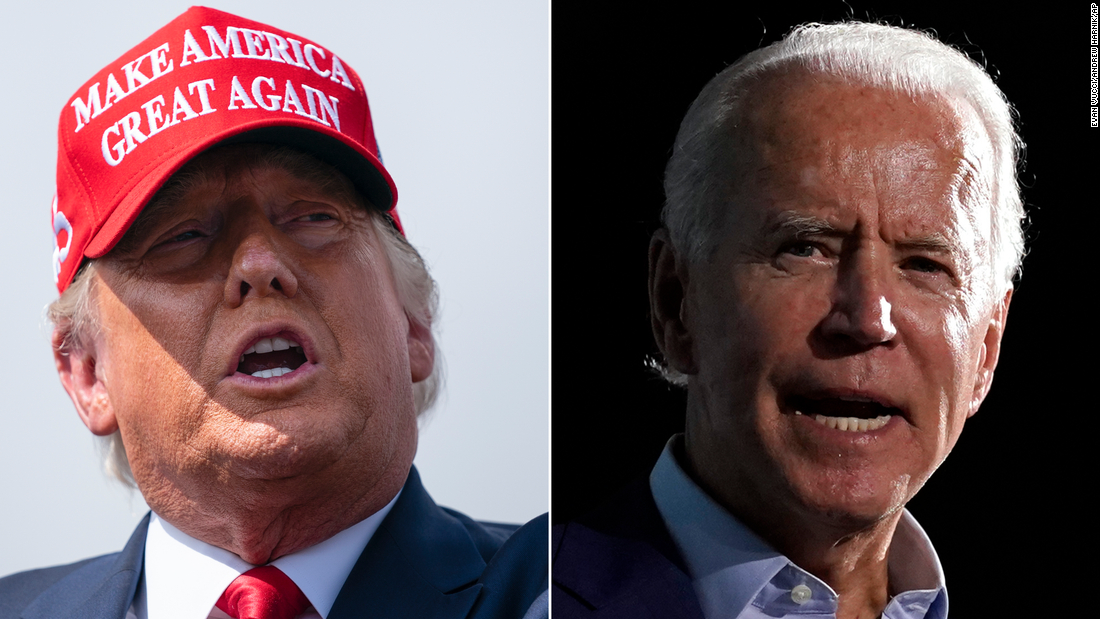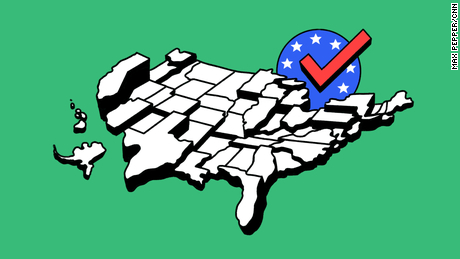Both candidates are rushing to drive out the votes of Americans not among the more than 91 million who cast early ballots
Tuesday’s moment of destiny — and what could turn into a prolonged count owing to the crush of mail-in votes — will decide whether Americans reject Trump after a single term or re-up for four more years of his brazen presidency.
Biden will campaign Monday in Ohio — a late addition to his target list — and Pennsylvania, the state of his birth that could be the tipping point if the election is close. Trump will mount a hectic trip aboard Air Force One through North Carolina, Michigan, Wisconsin and Pennsylvania in a last-ditch effort to save states he won four years ago and block Biden’s route to the White House.
“The truth is, to beat the virus, we first got to beat Donald Trump. He is the virus,” Biden said in Philadelphia on Sunday.
Both Biden and Trump have paths to victory
“We feel very confident about our pathways to victory,” Biden senior adviser Anita Dunn told Jake Tapper on CNN’s “State of the Union” on Sunday. Biden is hoping that wins in states like Arizona, Florida, Georgia or North Carolina could send an early signal on Tuesday night that he is heading for victory.
Trump, while trailing Biden, also has a clear, if narrower, chance to get to 270 electoral votes that relies on him sweeping through a swath of battlegrounds he won four years ago with what his campaign promises will be a huge Election Day turnout. The President cannot afford to drop states like Florida, Georgia or North Carolina and then must battle Biden in the Midwest — the decisive territory in his victory over Hillary Clinton, where he is struggling by comparison four years later. Still, the President is within striking distance in some swing state polls and Democrats are haunted by the idea that he could yet again defy expectations and pull off a stunning Election Day comeback.
Trump misleads on the virus and casts shadow over election night
At a rally in Florida on Sunday night, Trump’s crowd started a chant of “Fire Fauci” when the President complained that everyone heard too much about the pandemic.
Trump started his day Sunday in snowy Michigan, before traveling through Iowa, North Carolina, Georgia and balmy Florida in an exhausting swing that exemplified his stamina but also his defiance — and that of his big crowds — of social distancing measures his own government recommends to stop the spread of Covid-19.
He again claimed falsely on Sunday — at a rally in North Carolina — that the US was “rounding the turn” in its fight with the virus and that vaccines that he had at one point hoped to roll out before the election were “right there.”
The President is betting that a stream of pro-Trump voters not picked up by the polls will embrace his hyperbolic warnings of a takeover by radical Democrats if Biden wins and his denunciation of rioting in cities he blames on left-wing thugs.
But an air of foreboding is hanging over one of the most surreal elections in modern US history. Reports of delays in the delivery of mail-in votes in several crucial battleground states deepened anxiety over the possibility of protracted legal duels between the campaigns in the event of a close election.
The added time and complication of troves of mail-in ballots could offer the President leeway to cast fresh doubt on the integrity of an election that he has warned will only be fair he emerges as the winner.
And the President added to fears of a disputed election by again casting suspicion on the perfectly normal practice of vote counts continuing after election night — a likely occurrence this year since some states can’t even start counting the torrent of mail-in ballots until Election Day.
“I think it’s a terrible thing when ballots can be collected after an election,” Trump said in the crucial state of North Carolina, which he is battling to keep in his column despite demographic changes that give Democrats hope.
“I think it’s a terrible thing when people or states are allowed to tabulate ballots for a long period of time after the election is over because it can only lead to one thing, and that’s very bad. You know what that thing is. I think it’s a very dangerous, terrible thing,” Trump told reporters.
Elections are, however, not decided by time limits — they depend on all the votes being counted.
Concern over premature victory declaration
But Michigan Democratic Gov. Gretchen Whitmer said on “State of the Union” that she was concerned that Trump could try to declare victory in her state if Election Day voting tallies showed him with a lead before early and mail-in votes were counted.
“I think that’s a very real possibility and that’s why we are trying to make sure that everyone in the press understands the volume of votes that are coming in is like nothing we’ve ever seen before and it is going to take time to count,” she said.
“And it’s more important that we get a count that is accurate than a count that is fast and might not be accurate.”
Biden on Sunday sought to convince Black voters, who are historically more likely to vote on Election Day, to show up in the numbers he needs in cities and suburbs to make up for Trump’s dominance of the rural heartland.
He took part in a “Souls to the Polls” get-out-the-vote event at a Baptist church in Philadelphia and then held a drive-in rally. He called out disparities in the impact of the virus on minorities and, in the cradle of the American experiment, he painted Trump as a threat to basic American freedoms.
“Every generation has to fight to keep the democracy. I never believed we’d have to fight this hard though,” Biden said.
His running mate, Sen. Kamala Harris of California, traveled to North Carolina and Georgia, two states where Democrats believe they can win partly based on a strong turnout of African American voters.
“Let’s not ever let anyone take our power from us. Let us not be sidelined, let us not be silent, there is too much at stake and the ancestors expect so much more from us than that,” Harris said in North Carolina.
![]()




